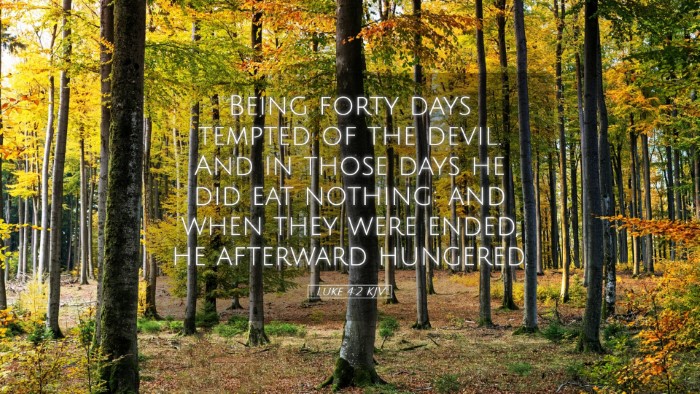Commentary on Luke 4:2
Introduction
Luke 4:2 presents a profound insight into the nature of Christ's temptation in the wilderness. This verse highlights the duality of His human experience and divine mission. The reflections on this passage from various public domain commentaries, such as those from Matthew Henry, Albert Barnes, and Adam Clarke, provide a rich tapestry of theological reflections valuable for pastors, students, and theologians.
The Context of the Verse
Luke 4:2 notes, "Being forty days tempted of the devil. And in those days he did eat nothing: and when they were ended, he afterward hungered." This verse is critical in understanding the wilderness temptations of Christ, particularly in the light of His ministry and humanity.
Insights from Matthew Henry
Matthew Henry emphasizes the importance of observing that Jesus' temptation occurred after His baptism and anointing by the Holy Spirit. He suggests that the timing highlights the stark contrast between Christ's divine approval and the devil's immediate challenges to His identity and mission. Henry notes:
- Affliction and Advanced Trials: "The Spirit leads Him into the wilderness for purposes of preparation and testing." The wilderness symbolizes a place of exposure, isolation, and spiritual warfare.
- The Duration of Temptation: "Forty days symbolize a period of trial and testing drawn from Israel's history." Just as Israel wandered for forty years, Jesus’ period of fasting and testing is significant.
- Physical Hunger as a Metaphor: "His physical hunger emphasizes His genuine humanity." Henry draws parallels with believers’ spiritual hunger, suggesting that temptations often arise at our weakest points.
Insights from Albert Barnes
Albert Barnes provides a robust analysis of the phrase “being tempted of the devil.” He identifies the devil as an adversarial force and examines the nature of temptation itself:
- The Source of Temptation: Barnes explains that temptation is permitted by God for the purpose of testing and proving faith. Jesus' temptation signifies the reality of spiritual warfare.
- The Severity and Length: "Being tempted for forty days signifies not just a single encounter but a prolonged engagement with evil." This detail underscores that Christ faced continuous temptation, unlike most believers who may encounter more intermittent periods of trial.
- Implications for Ministry: "Jesus' experience in the wilderness prepares Him for public ministry." Barnes asserts that through this trial, Jesus is equipped not only to resist temptation but to minister effectively to others who face similar struggles.
Insights from Adam Clarke
Adam Clarke's contributions add another layer of understanding to this verse. His commentary notes various contextual elements:
- Astrological and Historical Context: Clarke relates the forty days to a biblical pattern (Moses on Mount Sinai, Elijah's journey). Each of these instances serves as a prototype for divine preparation through rigorous trials.
- Spiritual Significance of Fasting: Clarke notes that fasting is not merely for self-denial but for spiritual focus and closeness to God. It highlights the seriousness of Christ's commitment to His mission.
- Relevance for Believers: "Clarke emphasizes that Christ’s victory over temptation offers assurance to believers." The passage reassures followers that they, too, can overcome temptations through reliance on divine strength.
Theological Implications
The combined insights from these commentators lead to several significant theological implications concerning Luke 4:2:
- Christ's Humanity: The passage confirms the genuine humanity of Jesus, who experiences real hunger and temptation. This invites deeper understanding of the Incarnation and the mystery of fully God and fully man.
- Model of Resistance: Jesus’ handling of temptation serves as a crucial model for believers. The wilderness proves to be a testing ground for developing resilience and reliance on God's word.
- Preparation for Ministry: The wilderness experience showcases that preparation for ministry often includes seasons of struggle and seeking God’s face, equipping believers to support others facing trials.
Conclusion
In summary, Luke 4:2 encapsulates essential elements of Jesus' ministry that resonate with the Christian experience of faith. The reflections by Henry, Barnes, and Clarke provide a multifaceted understanding that inspires pastors, students, and theologians to appreciate both the depth of Christ's trials and the assurance of His victory over temptation. Through collective insights from these commentaries, the verse becomes a timeless encouragement for those pursuing a deeper relationship with God amidst the challenges of life.


